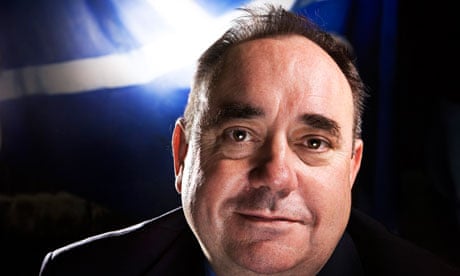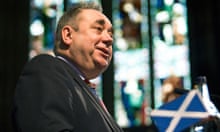The first minister was in a combative mood. In recent weeks, his opponents have ratcheted up their attacks on his nationalist government. David Cameron has accused him of cowardice, his mandarins are being accused of bias and UK ministers are trying to usurp his role as Scotland's most influential ambassador.
So, on a chilly evening in his oak and sycamore panelled offices at Holyrood, the night skies visible over Edinburgh's rooftops, Alex Salmond clearly felt like taking his fight to the enemy in typically uncompromising style.
He slapped down the most senior Scottish Liberal Democrat in the UK government, Danny Alexander, as a Tory mouthpiece, dismissed the prime minister as a political irrelevance in Scotland, and described the idea that the coalition has any mandate in Scotland as "absurd, fantastic, laughable".
"If they think politics is about getting together in a wee conclave like the witches in Macbeth and coming up with some great wee schemes to put a spanner in Alex Salmond's work and they think that's politics? They think that will endear them to the Scottish people? They will be laughed at from John O'Groats to Hadrian's Wall," he said.
His ire was provoked perhaps by a carefully scripted jibe by the prime minister at the Conservative party conference last week. At the party's Scottish reception, Cameron called Salmond a "big feartie", a scaredy-cat, for refusing to hold an independence referendum now rather than in three years' time.
Salmond dismissed this as a "banality", but his irritation was clear, fuelled by the Scottish National party's landslide win in May's elections for Holyrood. His anger did not appear synthetic. Scottish nationalists nurture a visceral dislike for English Tories.
Even so, Salmond – who acknowledged he does, partly at least, feel British – suggested he is willing to form alliances. He is prepared to compromise on introducing significant new powers for Scotland, despite deep reservations.
He is also willing to compromise on his referendum, with a second question to give Scotland economic autonomy without leaving the UK. On current polling, this measure is more likely than full separation to win majority support.
For the last five months, he has enjoyed unprecedented political dominance, after an election where the SNP defied the logic of Holyrood's semi-proportional system by winning an absolute majority, sweeping into power with nearly 50% of the vote.
Against him, he said, is a coalition government in London run by two parties that came a poor third and fourth in Scotland.
"I don't believe that the Conservative and Liberal coalition has yet come to terms with the fact that they've no mandate to run Scotland, no mandate whatsoever, not a scintilla of a mandate," he said. "This is the third and fourth parties in combination without a majority in Scotland.
"They're losing support; losing grip with reality. It's absurd for a prime minister to assume he has any legitimacy in instructing the Scottish parliament when they should hold a referendum on Scotland's constitutional future when we've got an impeccable mandate reinforced by a massive popular assent while they've no mandate whatsoever.
"The days of Tory PMs telling Scotland what to do are over and the fact that David Cameron doesn't seem to appreciate that, and doesn't seem to understand the dangerous territory on which he's treading, is a remarkable feature."
In May's election, the Lib Dems were crushed and left with five seats, the Tories with 15 and Labour nursing nine fewer at 37. All three parties have had to find new leaders; only the Lib Dems have succeeded so far.
Yet Salmond's opponents are beginning to compete. They are challenging his measures to penalise sectarianism at football matches and attacking him on university mergers. Labour, the Tories and Lib Dems at Holyrood have formally complained about alleged pro-nationalist bias by Scotland's top civil servant, Sir Peter Housden.
UK ministers are travelling to Scotland to build up London's profile and influence. Michael Moore, the Scottish secretary, has set up a Scottish trade board to compete with domestic investment agencies. And Cameron, Alexander, the chief Treasury secretary, and Moore's deputy David Mundell, Scotland's only Tory MP, are beginning to chip away at Salmond on independence.
In reflective mood initially, Salmond said his government – now in its fifth year and second term in power – was proving itself. "For Scotland to become independent, we've got to demonstrate three things.
One is competence in running the country, so as people understand and trust in the future, that we've the potential to do things. That's what we demonstrated in the first term.
"Secondly we've got to – and not all people in the SNP always believed this – indicate that we're prepared to deal with Scotland's own problems, own difficulties, own demons if you like. Let's take two: sectarianism and alcohol.
"Scotland is the greatest country on earth as far as I'm concerned, but that doesn't mean I'm blind to the shortcomings we have. But every country has shortcomings; how you judge a country is how it copes with shortcomings.
"And thirdly, we've to raise the bar of ambition so more and more Scots share our ambition for a different future. And on all three of these things I think we've largely succeeded." That reflective tone ended when asked about tentative proposals by UK ministers and Labour leaders at Westminster to co-operate on the referendum, or even take control of it. Salmond was openly contemptuous.
He was categorical that the referendum will be run by Holyrood, including donations and spending limits, reserved to Westminster for general elections.
"All of that is a decision for the Scottish parliament. This is the beginning of wisdom, to understand the terms of the political rules have changed."
Alexander believes that Salmond's claim to have an absolute mandate is misplaced. He argues that the UK government, too, has a mandate: the combined Tory and Lib Dem vote in 2010 was close to the SNP's total vote in 2011.
"I have never heard anything so absurd in all my life," Salmond replied. "The SNP achieved the most unprecedented, impossible feat of gaining an absolute majority in a system designed not to produce overall majorities."
Yet the Conservatives, in a system designed to produce majorities, could not win one across the UK, he added.
"Working together they've a huge minority of the votes cast in the 2010 election.
"The political reality is that the Liberal [Democrat] party is now a shell organisation in Scotland. Danny Alexander is chief secretary to the Treasury and a Tory party mouthpiece in the Highlands. His political life expectancy is exactly the length of time this parliament lasts at Westminster."
Yet Salmond said he will co-operate with Westminster by ushering through its reforms strengthening Holyrood. The governments are battling over his demands that the Scotland bill, which will already give Holyrood control of income tax rates, some minor taxes and £2.7bn of borrowing, has to be extended.
The first minister said he will support the bill, so long as the UK government guarantees that the income tax powers will not leave Scotland worse off.
"It's a backdoor method of reducing Scotland's funding, something the Treasury has wanted to do for a generation," said Salmond.
And on the referendum comes a significant disclosure: Salmond believes some civic groups and business leaders will support a second question short of full independence known as fiscal autonomy or "devo max", under which Scotland raises taxes and controls the welfare system but shares UK services such as defence and foreign affairs.
Westminster will not support that. Cameron has insisted Salmond should pose only one question, leaving Salmond with the dilemma of finding someone to campaign for it.
"There's plenty of evidence that's a very popular option. Unfortunately no other political party is pursuing this option," he said. "A number of people in civic society have indicated broad support for a second option."
But as Salmond acknowledged, this is several years off. What he plans to do immediately is prove that Scotland can survive on its own. Even with the best polls showing a minority of Scots want independence, can he win it?
"I believe once we articulate our independence case, we will win the referendum. I have always believed that."


